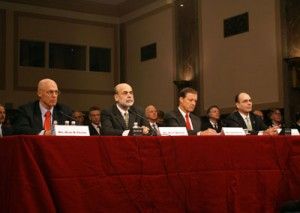Tuesday

Bailout Podcast
Real good podcast over at Econtalk: Neil Barofsky, talking about his new book, Bailout. Barofsky was an insider to the whole TARP operation, working as "Special Inspector General" in the Treasury. Barofsky is, from what I can tell (judging solely from the podcast), a government guy. He believes in the government, even the federal government. Indeed, he seems to put too much faith in the government (though his faith has been rattled), but the whole TARP situation was insidious and he knows it. It's just another instance of the Hudge and Gudge problem that Chesterton and others have been pointing out for years: big business and big government collude to screw the rest of the country.
Here's Barofsky's (too generous to the government) take:
This is part of the problem that existed then and continues to exist today, is that because of this revolving door between Washington and Wall Street, you have a government, and the Treasury Department and federal regulators like the Federal Reserve, that is so captured by the interests of Wall Street, so familiar, that when you are within a crisis or when you are crafting legislation or when you are designing a bailout program, as I saw time and time again, you go to those people for advice and guidance and your information. And not surprisingly, when they provide you that advice and guidance, it is mostly in the interests of those Wall Street banks. Not necessarily in the interest of the taxpayer or the general Main Street or the rest of the country that is supposed to be benefiting. So, I think that there is a lot of asymmetrical information flow that comes from Wall Street into Washington; and because of where these people come from and also who they surround themselves with, these arguments take on more weight than they otherwise should or would. And I saw that over and over again in the bailout. As these programs were designed and implemented, and as I fought for types of what I thought were really basic types of protections and transparency, like, how do you, how are they using the TARP money, they would just call up, get the arguments, and recycle and regurgitate them to me or to members of Congress. And so you have this identification at the highest levels of power in Washington, with the Lloyd Blankfeins and the Jamie Dimons and the various CEOs. Because those are the people that they rely on. And those are the people that they trust more than anyone else as knowing what the right thing to do is. So I think you are absolutely right, actually, and that cynicism is well-founded. So, although, I truly believe that Ben Bernanke and Hank Paulson and Timothy Geithner, who was then President of the NY Fed, truly 100% believed that they had to do exactly what they did lest it be the end of civilization, a lot of that information was coming from the institutions and executives who benefited the most from it.
If Barofsky spent more time reading Nock, GKC, and others, he wouldn't think Bernanke, Paulson, and Geitner acted honestly. He would think they acted, at best, out of willful ignorance.
It's valuable testimony for anyone who thinks this upcoming election will make a big difference. It won't: DC will do what Wall Street wants, and it doesn't make a difference who's in power. If war in Iraq serves big business, we'll get war in Iraq. If more federal aid to colleges is what big business wants, even if that means tuition continues to soar for the middle class, we'll get more federal aid to colleges. The ultimate winners this November won't make a noticeable difference in ultimate policy. The ultimate winners are always the masters of Wall Street and their allies.
Great "Picture of the Day" yesterday at Wikicommons. It's a photo of midtown Manhattan, taken from Weehawken, New Jersey (photographer: Dmitry Avdeev):

